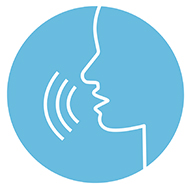Speech & Language Therapy

Our team of skilled Speech and Language Therapists is committed to providing comprehensive evaluation and treatment for a wide range of speech, language, voice, and swallowing disorders in adults. Whether you seek assistance with speech clarity, language expression, or enhancing social communication skills, we are here to support you in achieving effective communication across all aspects of your life.
MIND offers adult Speech and Language Therapy in the following areas:
- Speech and Language Disorders: We address difficulties related to speech sounds, clarity of speech, and expressive and receptive language skills, providing tailored interventions to enhance your communication abilities
- Dysphagia: Our therapists offer evaluation and treatment for difficulties in swallowing, drinking, chewing food, and issues related to drooling, ensuring safe and comfortable eating experiences
- Cognitive-Communication: We provide support for individuals facing challenges in areas such as orientation, problem-solving, memory organization, and attention, aiming to improve cognitive communication skills
- Social Communication: We focus on enhancing skills related to taking turns in conversation, understanding conversational dynamics, and improving overall social communication abilities to foster meaningful interactions
- Pragmatics: We work on developing pragmatic language skills, which involve the social use of language in various contexts, promoting effective communication in social settings
- Auditory Processing: Our therapy targets the improvement of auditory processing skills, helping you better understand and interpret auditory information, contributing to clearer communication
- Fluency Disorders (Stuttering and Cluttering): We provide individualized therapeutic techniques based on each individual's fluency index and helpful strategies to manage accessory behaviors, supporting confident communication
- Voice and Resonance Disorders: Our therapists address issues related to pitch, volume, quality of voice, and hypernasality/hyponasality, working towards optimal vocal communication
- Neurologically-Based Communicative Disorders: We address issues related to Aphasia, Dysarthria, Apraxia, right hemisphere damage, as well as dementia or traumatic brain injuries
- Alternative/Augmentative Communication: We offer training and support in using alternative communication systems for populations with special needs to enhance communication abilities and provide versatile communication options such as laryngectomy cases
Our Approach to Speech and Language Therapy:
At MIND, we take a personalized approach to adult Speech and Language Therapy. We conduct comprehensive assessments to identify your unique communication needs and develop individualized treatment plans. Our therapists prioritize evidence-based interventions to ensure effective progress and positive outcomes.
